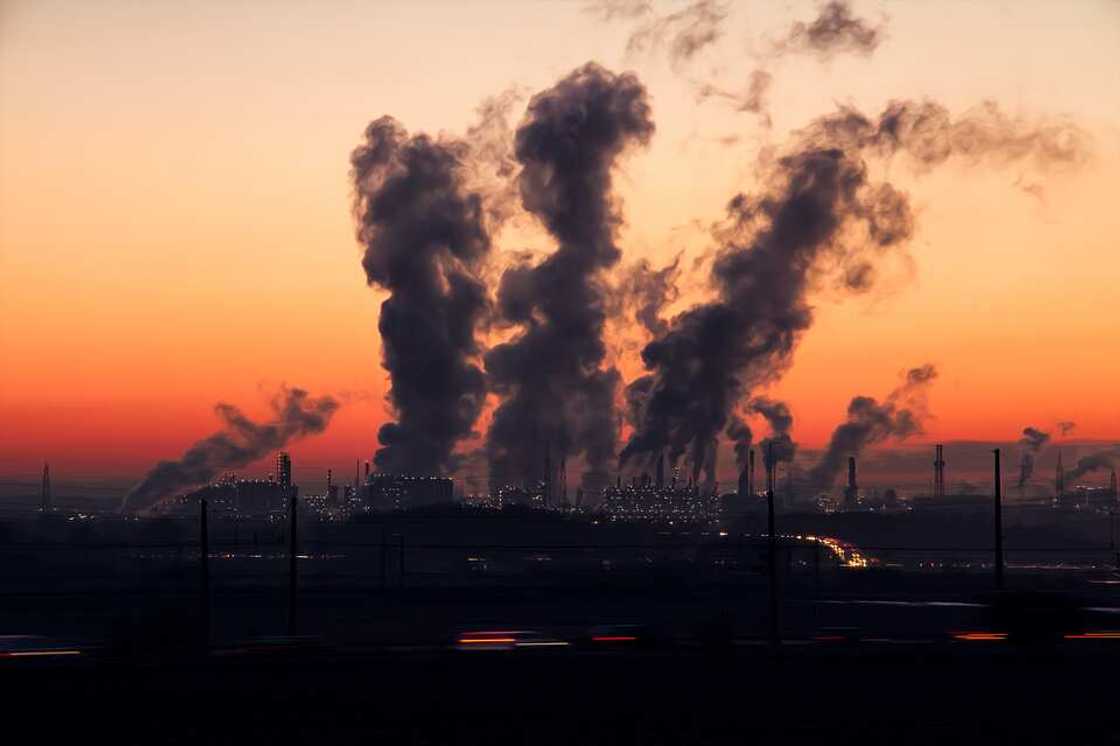Environmental health: definition, components, importance
Even though people do not always notice how much the environment impacts them, it is something that happens every day and holds significant influence on our lives. All the aspects of our life, including our way of living, the food we consume, and our interactions with the outside world can be classified into a healthy or unhealthy category. This is why environmental health is so important, and today we will learn about it in depth.

Source: UGC
A lot of people consider environmental health to refer only to clean water and air. However, there is a much bigger picture to this term. There are plenty of factors that influence the environment of a particular area and determine whether it is healthy for a person to live in, or if it can bring a lot of health-related risks.
What is environmental health?
Environmental health definition, according to the World Health Organization, is "the aspects of health, which are determined by various environmental factors." Except that, this term makes a direct reference to the control and assessment of the factors which could have a negative influence on the person's health. Those factors are not always under our direct control, but there is still a high chance that they could affect our physical and mental well-being.
Public health is the term which includes some areas, environmental health being one of them. There are also a few terms that have a close connection to it, namely environmental public health. Another word that concerns this issue is environmental public health protection.
Imagine that you reside in the neighbourhood where the air pollution levels are critical, and the sidewalks are not safe for moving, so it is quite difficult to leave the house for the morning exercise. This means that the neighbourhood is not environmentally healthy, and the measures have to be taken for improving the quality of life and preventing various incidents that could happen. Ask yourself: what material was your house built of? Are there any insects that live not far from your home, and what influence they can have on people? Do you have access to food of high quality? All those questions and more can help you understand whether your area is environmentally healthy, and what can be done to protect the residents. Simply speaking, environmental health is the public health area, which deals with the impact of the surroundings on the well-being of a certain area's residents.
In conclusion, environmental health is a bunch of practices, which are supposed to prevent injuries and illnesses among humans and promote their mental and physical well-being. The main objectives of these practices are to identify and evaluate different agents of hazard and their sources in the environment and limit the human exposure to those agents in all the substances that the person encounters daily, such as water, food, air, soil and other surrounding environments.
Environmental health components

Source: UGC
The scientists work in the field of environmental health every day and achieve useful results for society. The elements of environmental health are scientific disciplines that centre around this notion and provide different kinds of information that complete the big picture of the current ecological state. Some of the necessary regulations which provide substantial contributions to environmental health are the following:
- Environmental epidemiology – this discipline aims to study the relations and interactions between human health and various kinds of exposure to harmful environmental agents.
- Toxicology – people who contribute to this field study the particular health results which are caused by the exposure to the toxic environment. Mostly, toxicology studies animals and their reactions to the disclosure, which helps to understand the similar human behaviours clearer. Sometimes there can be uncertainty for the reason that human and animal biology is different, but very often the parallels between those species can lead to a better understanding of human reactions.
- Exposure science – this scientific branch is focused on studying human exposure to the factors that contaminate the environment. The scientists who work in the exposure science field have the objective to identify the vulnerabilities and quantify them. Unlike the previous two disciplines, it does not provide information about human health outcomes caused by exposure to dangerous chemicals.
- Environmental engineering – this discipline studies the principles of science and engineering, which could be applied to protect the population of the planet from harmful environmental factors. This includes the protection of humans and the environment from the destructive effect of human activities, as well as the overall enhancement of the ecological well-being.
- Environmental law – finally, this discipline studies the regulations, treaties, statutes, and rules which concern the post-effects of human activities in the environmental surroundings.
Environmental health importance
You have learned the essential components of ecological health which greatly help with understanding the big situation. Basic knowledge about environmental health holds a tremendous significance to every person because nowadays, its state in the world could be much better than it is. The main issues that we, even unknowingly for ourselves, deal with every day, are the following: air and water pollution, effects of natural disasters, food quality and many other aspects that make our life more difficult.
The environmental health disciplines are determined to identify all the aspects that could pose a threat to human health and exterminate those problems. Concern about social well-being is the main reason why it is crucial to raise awareness about environmental health. Below, you can read more about the particular concerns that need a gradual solution.
Environmental health concerns

Source: UGC
There are a lot of primary issues that environmental health specialists view as a priority these days. Here are some of them:
- Air quality. A lot of people are heavy smokers, or they enjoy lighting a cigarette once in a while. Either way, they pollute the air with the cigarette smoke, and this can affect not only them but other people who are forced to breathe in this air. There is such a term as "passive smoking", which means that the person who inhales tobacco smoke is also under a lot of risks. The environmental health specialists are concerned both about the outdoor air quality and the indoor one, which is even more severe since the person who has to inhale smokes in the closed room is facing plenty of potential risks.
- Biological safety. This aspect focuses not only on human health but also on ecological issues. The primary purpose of biological safety is to follow the strict guidelines on protecting people and environment from exposure to the various natural hazards which could cause harmful effects.
- Climate change. With time, this factor becomes more and more severe and has a lot of harmful influence on people's health – both physical and mental. It also has a lot of indirect effects, such as causing drought, hurricanes and floods among many other things.
- Emergency management. This term stands for the control of responsibilities and organisation of resources which are supposed to be effective in dealing with the emergencies, mainly their humanitarian aspects. The primary purpose of emergency management is the reduction of harm caused by natural disasters.
- Food safety. Tracking spoiled and contaminated food which could cause illnesses and not letting people consume is one of the significant tasks of the environmental health program. There is a lot of routines which are implemented to avoid food-borne diseases. Food safety is an incredibly important factor in environmental health since food which contains bacteria can cause a lot of diseases. The task of environmental health specialists is based on the prevention of such situations and making sure that only high-quality food reaches consumers.
- Hazardous material management. This aspect includes the management of waste which could potentially bring environmental threats to people or surroundings, finding the remedy for contaminated areas, the prevention of underground storage tanks experiencing leaks, and stopping the release of hazardous material into the environment. People who are responsible for this management have to immediately respond to any emergency calls which are concerning these issues.
- Housing. The houses also need to be inspected and searched in case of any environmental issues that could potentially pose a threat to people residing there. The inspection of the homes includes the substandard housing areas, as well as prisons and jails which are also under the risk.
READ ALSO: Types of waste in Nigeria

Source: UGC
- Lead poisoning prevention. Lead is the chemical which can cause severe poisoning with serious symptoms, including headache, abdominal pain, memory issues, constipation, irritability, tingling and many others. In some cases, this poisoning can even cause a lethal outcome. The person is exposed to lead through the contamination of water, food or air. The group under the risk of such poisoning are young children because they often put something in their mouth. People can also be exposed to lead at work. This is why it is essential to inspect and investigate the existence of lead in the working and living environment.
- Land-use planning. The term "land-use planning" refers to the regulation of land use with the purpose of promoting better environmental and social outcome, together with the efficiency in using natural resources. Some of the goals which are usually set by land-use planning are restraining the unrestricted urban growth, environmental protection, prevention of the misunderstandings related to the use of land, reducing the exposure to contamination, and minimizing the costs of transportation.
- Liquid waste disposal. The waste of water needs to be recycled, and there are programs which foresee reusing the wastewater for other purposes. The direct reuse of water is meant to have the minimum harmful consequences for the environment.
- Medical waste management. The biomedical waste, which comes from the laboratory or hospital, contains a lot of infectious bacteria. For instance, the sharps, even if they are not used, are an example of biomedical waste, because there is always a chance that they have been contaminated with blood and infection. This type of waste requires special types of disposal, which every worker who is involved in this field needs to know about.
- Noise pollution control. Environmental noise is a special type of pollution because noises are one of these factors that cause harm to people and animals. Usually, in big cities, noise pollution is mostly caused by vehicle traffic. The buildings which are situated close to the airport also struggle with the problem of aeroplane noise pollution. Another example of such an effect is loud reparation works, which often take place in the residential areas. The high levels of noise have an extremely negative influence on human health, causing a lot of heart and blood diseases. Except that, being exposed to dangerous sounds from a young age is not good for a child's development. It also negatively influences animals, increasing the risk of not being able to hear possible predators or resulting in hearing loss.
- Occupational health. This type of discipline concerns the workers and their safety. The primary goal of occupational health is creating and maintaining a healthy and safe environment for people who are involved in some kind of work. This sphere is often backed up by law, which requires the employers to take care of their workers and their safety. It protects people whose work conditions might harm them and negatively influence their health, and work hard to create a positive environment for them.
- Radiological health. This concern is raised to prevent people from the exposure to all kinds of radioactive substances, including ionising radiation which comes from the X-rays and radioisotopes.
- Recreational water. One of the most popular activities for people on the hot sunny days is having fun in the pools, resting at the spa, and swimming in the ocean. There are special measures taken to control the quality of water which people bathe in and prevent them from bacteria and illnesses that they could encounter in this water.
- Safe drinking water control. The quality of water that people drink is no less significant than the condition of water where they swim. Every person needs to stay hydrated, and for the best effect, at least one litre per day has to be consumed. In developed countries, there are a lot of clean water resources, and there is just enough water for everyone. On the other hand, in less developed areas there is a deficit of clean drinking water, and toxic bacteria pollute a lot of it. Many people even die due to lack of safe water that they could drink. This problem is more severe than people usually realise, and this is why it is especially significant to control the state of drinking water.
- Solid waste management. This term stands for undertaking various actions for managing the discarded waste until it is disposed of. Among these actions are collecting the garbage, transportation of it to the places of disposal, and proper treatment until it is got rid of. There are a lot of different types of waste, and solid waste is only one of them. Solid waste can be recycled and reused, and it needs to be re-purposed in a timely fashion until it starts to pollute the environment and pose a threat to people's health.
- Toxic chemical exposure. There is a high level of toxicity in many chemical substances, which means that it is highly likely they can pose damage to the life form. A lot of elements can be toxic – even those which are not particularly toxic by its nature can pose a threat to human's health if they are taken in larger quantities. In many situations, toxic substances can cause serious diseases and even fatal outcome to the body as a whole or particular organ. The mix of some elements can also be toxic to the organism. The poisonous chemical exposure concern is connected with the fact that they can appear in the products which are consumed by humans, as well as in the air, water, living residences and working places.
- Vector control. Another concern is getting rid of the animal species, including insects, birds and mammals, which are carrying dangerous diseases and viruses. Mostly, vector control is based on managing mosquitoes through the vast amount of strategic moves. This is a significant concern for environmental health because tropical infections are prevalent and can be spread by vectors. Some of the means that are used to reduce the influence of vectors on society are limitations of the exposure, as well as chemical and biological control.
How to help the environment?

Source: UGC
Even though the environmental health of our planet is mostly taken care of by the specialists, every person needs to contribute to the well-being of the earth at least a little bit. If you are sure that there is nothing you can do to improve the environmental health of the planet, you are wrong – there are a lot of ways to do it. Here, we will introduce some of them.
- Use reusable bags. Plastic bags which are being thrown out will damage the environment. Among all the other things, they take a lot of time to decompose and may hurt animals which can get suffocated inside them or mistakenly eat them together with food. Try to minimise the use of plastic bags and trade them for a reusable bag.
- Do not print a lot. So many people who work in the educational sphere, for example, university teachers, do not seem to understand that using a lot of paper is harmful and that there are a lot of alternatives nowadays. For instance, students can open their study documents on their laptop or electronic reader. It is not necessary to use so much paper for printing out the course works or readings for the classes, because people throw it out anyway and damage their surroundings. Except that, if you are a student, it would be a good idea not to throw away your notes and possibly pass them on to younger students.
- Recycle. Technically, recycling is a straightforward and simple thing to do. Nonetheless, many people are not aware of their possibilities. There are plenty of recycling services these days offered by garbage disposal companies. You can also find special trash cans for recyclable items in your neighbourhood.
- Use the reusable bottles. Plastic water bottles are just as bad for the environmental health as plastic bags. Therefore, instead of purchasing individual drinks and then throwing out the bottle, you can buy the single bulk container of your desired beverage and using a reusable bottle for carrying it around with you.
- Save as much electricity as you can. This point can be implemented by using the bulbs which save energy. Also, do not turn on lights unless completely necessary – try to minimise the usage of TV and other technology. Air conditioning and heating systems should also be saved for special causes.
- Save water. Some of us do not even realise how much water goes to waste. For example, people turn on water before they take off clothes and get in the shower or bath, and keep the water running while they are brushing their teeth. If you want to save water resources, you are strongly recommended to avoid these mistakes and limit the usage of fresh water as much as you can.
- Avoid cars unless needed. Even though life without cars is hard to imagine nowadays, they produce too much exhaust fumes and pollute the air. This is why sometimes instead of using a car to go somewhere, you can walk there or ride a bike. It is not only good for the environment but also helps to stretch your bones.

Source: UGC
Environmental health plays a huge role in our life, even if we do not always realise this. There are so many factors that influence the general condition of the neighbourhood, and every person can make a positive contribution to their area's health.
READ ALSO: Sources of water pollution
Source: Legit.ng







